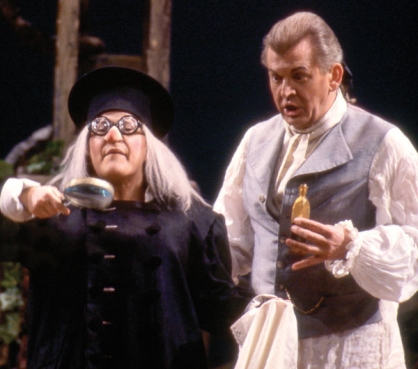Mozart’s opera buffa is a perplexing one, and in spite of appearances, a very dark one indeed.
It is this mix of comedy and tragedy that attracts me, and led me to write this post.
Così was written quickly, over the autumn and winter months 1789 and premiered on January 26, 1790, on the eve of the Mozart’s 34th birthday.
Dramatis Personae
Fiordiligi: Lady from Ferrara and sister to Dorabella, living in Naples
Dorabella: Lady from Ferrara and sister to Fiordiligi, living in Naples
Guglielmo: Lover of Fiordiligi, a Soldier
Ferrando: Lover of Dorabella, a Soldier
Don Alfonso: an old philosopher
Despina: a maid

Synopsis
In a coffeehouse, Guglielmo and Ferrando, two soldiers, discuss with Don Alfonso,an old philosopher, the faithfulness of their fiances, Fiordiligi and Dorabella. Don Alfonso dismisses all that, and bets that he can prove within a day that Fiordiligi and Dorabella like all women, are fickle.

The two men will pretend they have been called to active duty, and they will leave (only to return in disguise). They announce the “bad” news ot their fiances, and they sail off to “war”. As they do, Don Alfonso, Fiordiligi and Dorabella wish them a safe trip: Soave sia il vento—”May the wind be gentle”
When left alone, Alfonso predicts that he will prove that all women are unfaithful: Oh, poverini, per femmina giocar cento zecchini? (Poor ones, (how stupid can you be) to wager 100 sequins on a woman?)
The arrangement is that the two men will return disguised as mustochioed Albanians and will attempt to seduce the women, swaping one for another. Ferrando will (attempt to) seduce Fiordiligi and Guglielmo will seduce Dorabella.

In the sisters’ home, Don Alfonso meets alone with Despina, the maid of the sisters, and bribes her to cooperate, as he is afraid that she will recognize the two men in spite of their disguise. Despina is fully part of the plot as the two “Albanians” enter the scene and offer to the two sisters their unlimited and irresistible charm.

The charm of the “Albanians” is not working and Despina asks Alfonso to take over. Extreme actions have to be taken. The two “Albanians” fake severe illness and Despina arrives disguised as a doctor to treat them. Eventually the two sisters succumb to the charm of the “Albanians” and the swap is done.

The four are now ready to be wedded, but in the “swap” mode. Despina now disguised as a notary presides over the event. Don Alfonso has won the bet! Women are fickle!
In a sudden change of the scene, the “Albanians” disappear, and the two soldiers return to find their beloved ones and confront them with the “contract” of their marriage to the “Albanians”.

In the finale, the men receal their “mixed” identities, and they all accept that life must be accepted with the good and the unavoidable bad times.
But of course it is not “life” we are talking about, the story is about people, and trust, and betrayal. And the moral of the story is that you cannot trust anyone! Unfortunately it is not only women who are fickle, everyone is fickle!
A Philosopher
What is a philosopher? What is philosophy? Definitions vary. I will quote some passages from Bruce Alan Brown’s article (included in ROH’s program of the 1995 performance).

…..Pierre Richelet’s dictionary of the French Lnaguage (1775) gives as its primary definition of philosophy “love of wisdom” or “clear and distinct knowledge of things natural and divine”; but other senses of the word are given as well, including “firmness and loftiness of mind by which one puts oneself above the accidents of life and the false opinions of the world”.
It is precisely this trait which so distinguishes Alfonso from his young friends and which moves him to explain to them that “[….] in ogni cosa /Ci vuol filosofia” (philosophy is necessary in all things) after both sisters have been proved to be unfaithful. A “philosophical” attitude implied a forgiving nature, as one sees at the end of COSI.
….. The entire opera is premised on Rousseau’s notion that experience precedes understanding. Alfonso cannot simply tell the soldiers that women are inconstant, or the sisters know precious little about love. If they are truly to learn his lessons, they must experience the pain that comes from being deceived of their initial notions. The cruelty for which Don Alfonso has so often been criticized is the same as that of the tutor in Rousseau’s Emile, ou De l’Education, whose pedagogy amounts to “a minutely organized and vigilantly executed conspiracy”.

….It is Despina, not Alfonso, who presents the most complete “philosophy” of love in Cosi fan tutte. The creed she recites just before the first finale is a mixture of proverbial folk wisdom and current “naturalist” philosophy, probably learnt second-hand. The taking of a second lover, she declares, is not merely prudence byt a “law of nature”.
Jonathan Miller
I was lucky to have seen Jonathan Miller’s 1995 production of Cosi fan tutte in the Royal Opera House, London. This was his debut in Covent Garden, and what a debut it was! It is a production that has already been staged seven times since. From the archives of the Royal Opera House I can see that the production has been now modified to adopt a modern set and costumes and devices: the singers are using iPhones!


